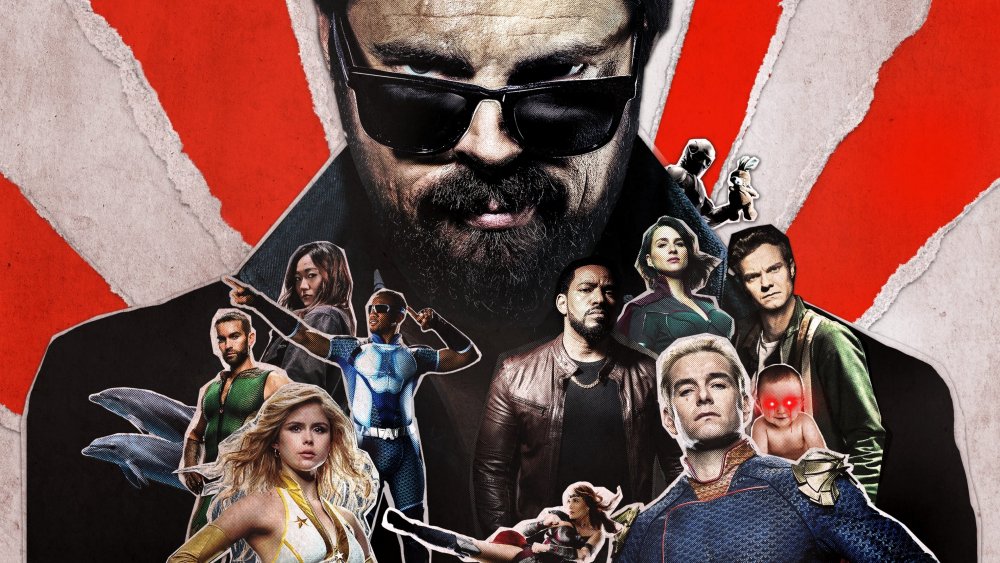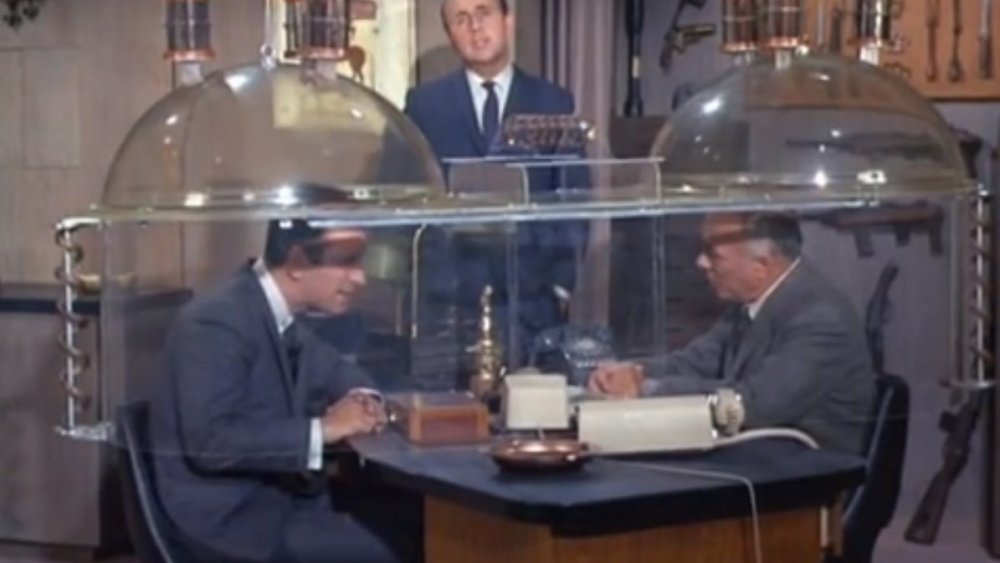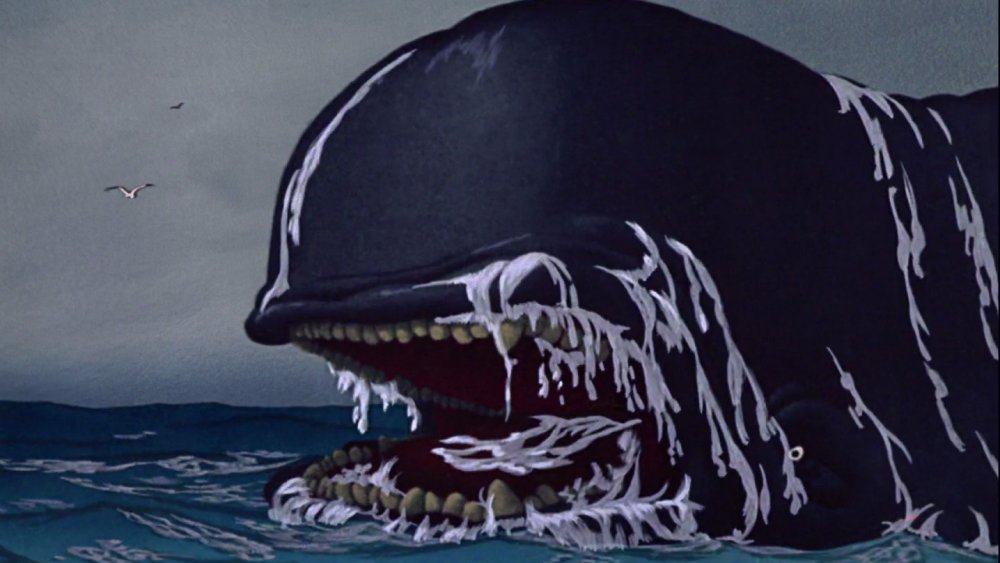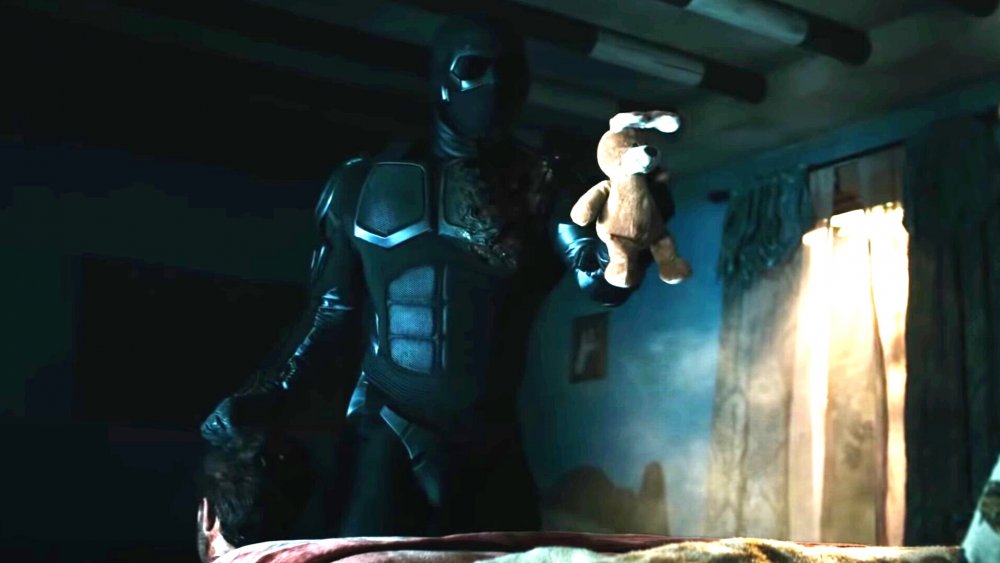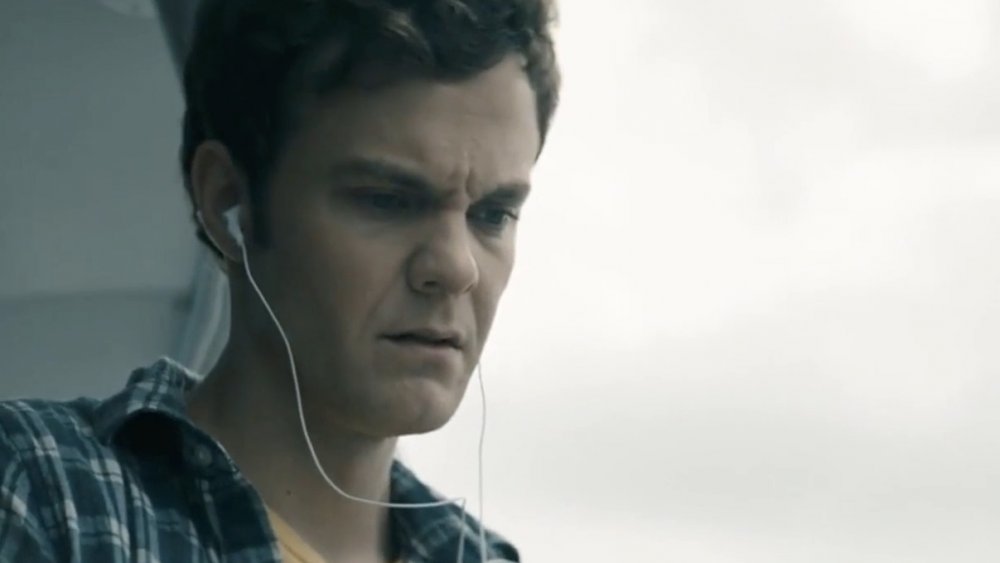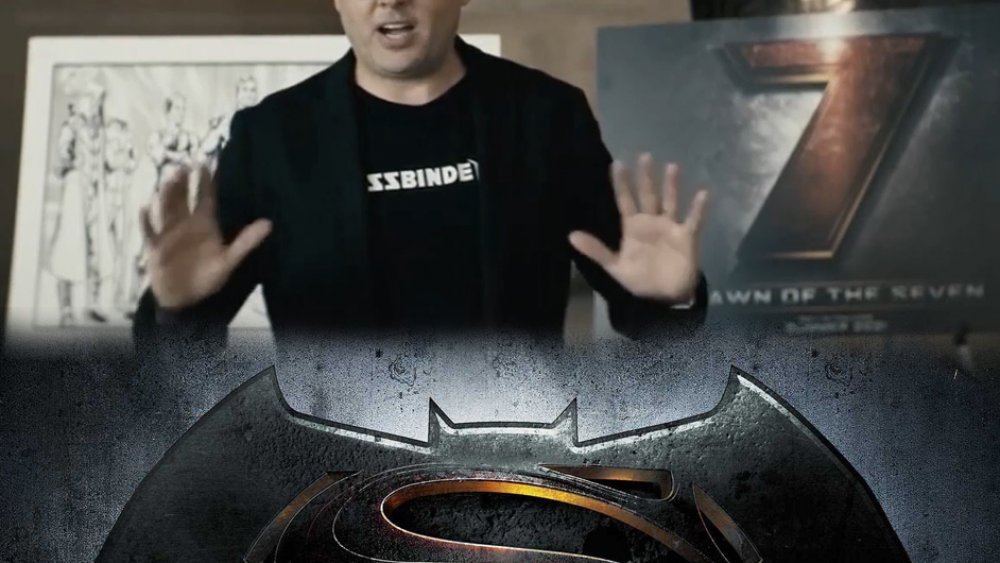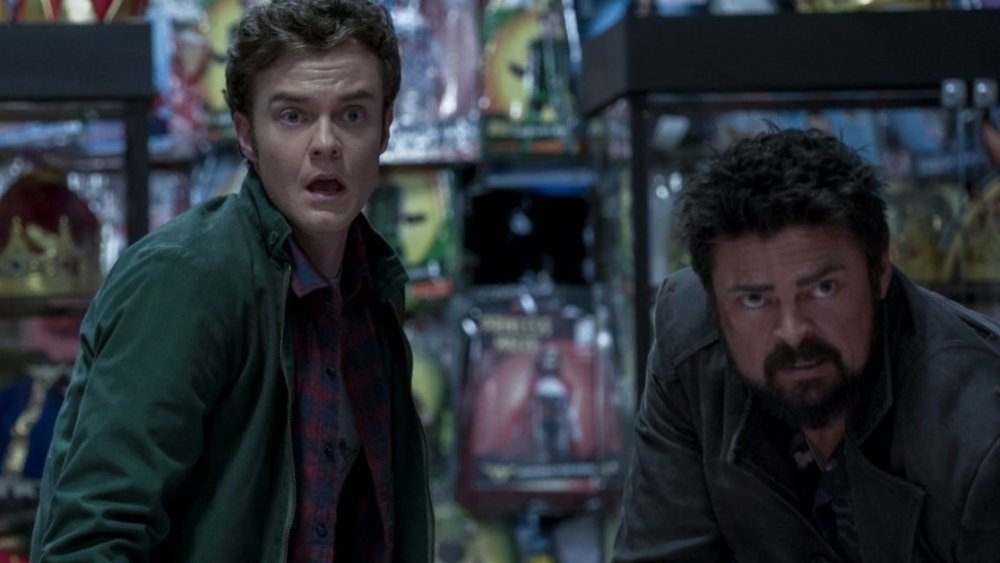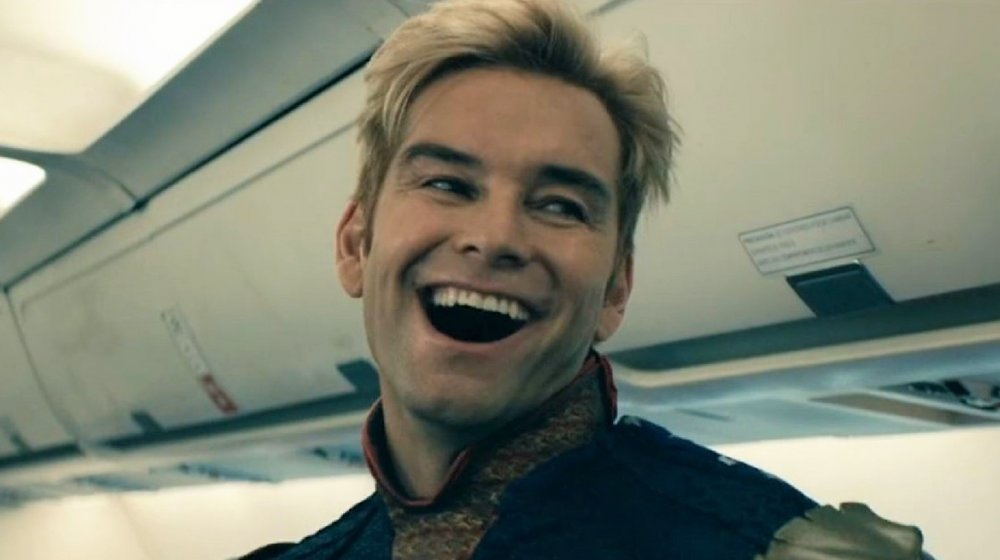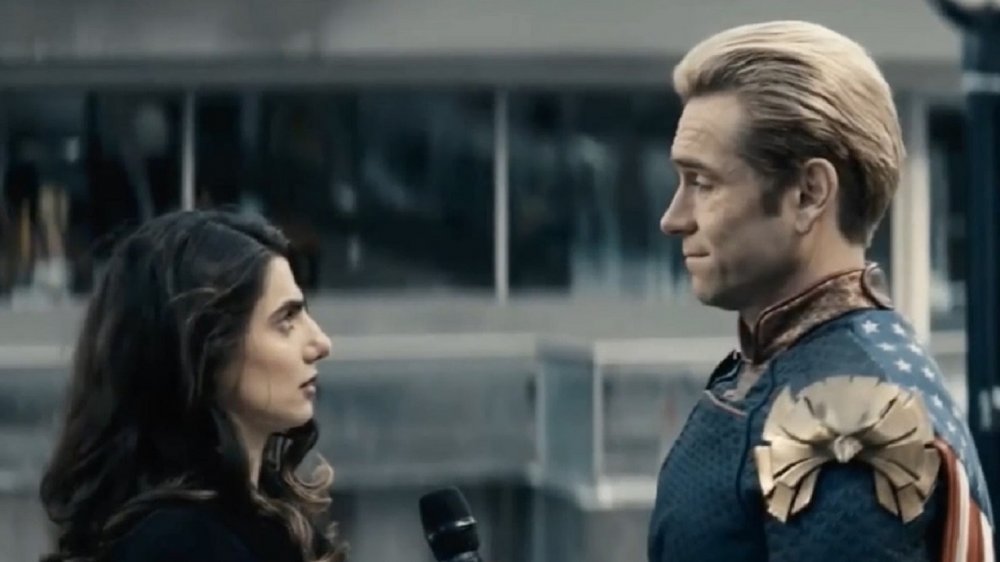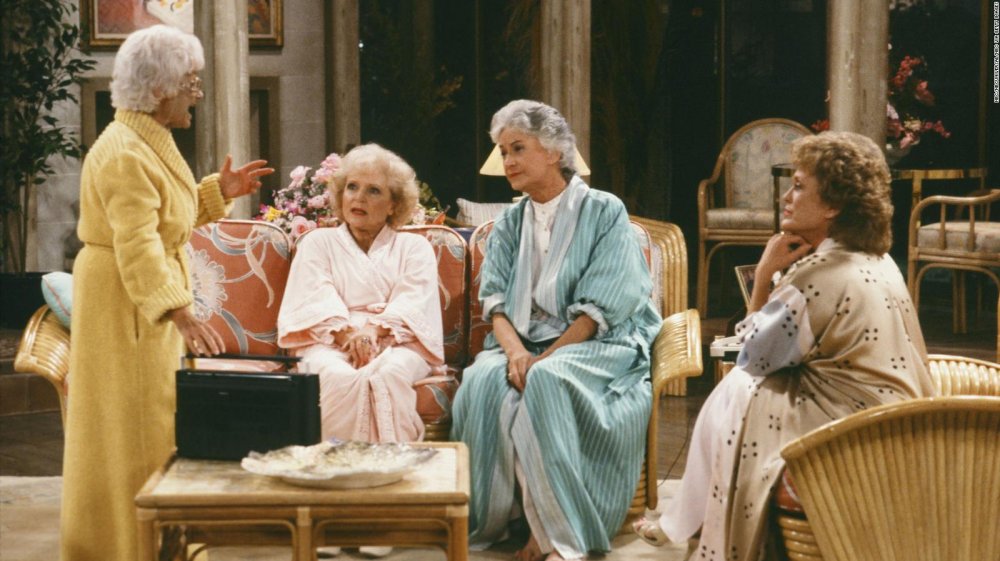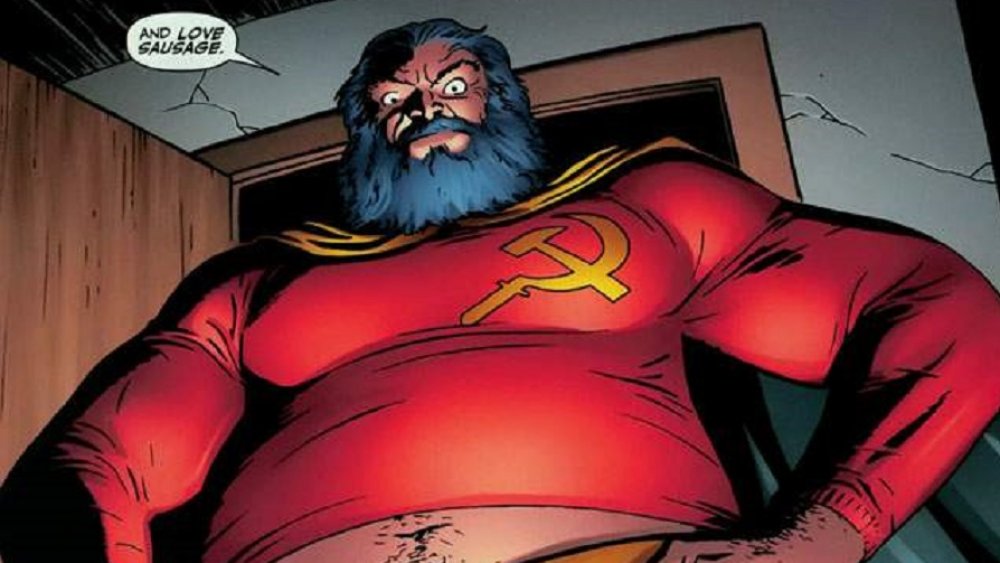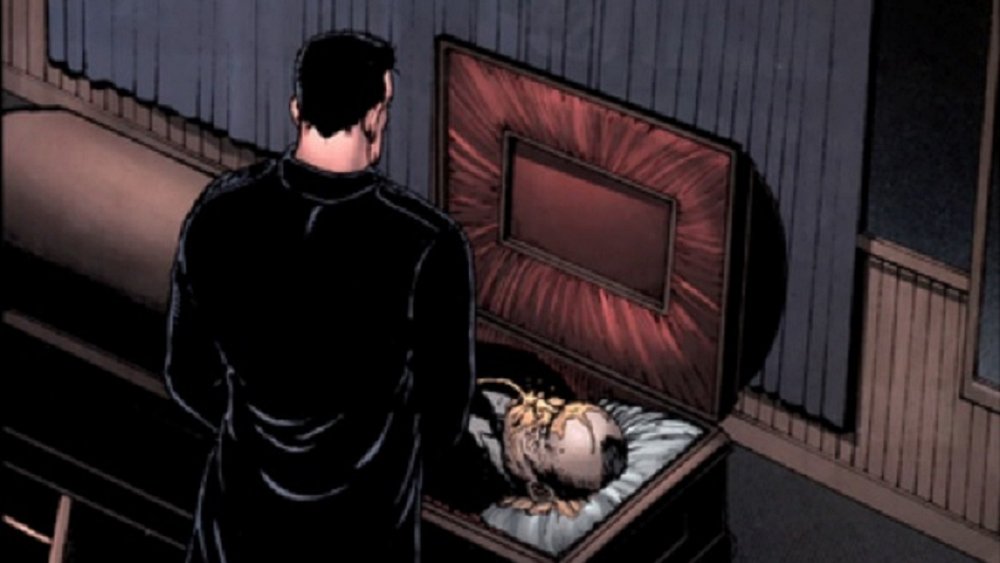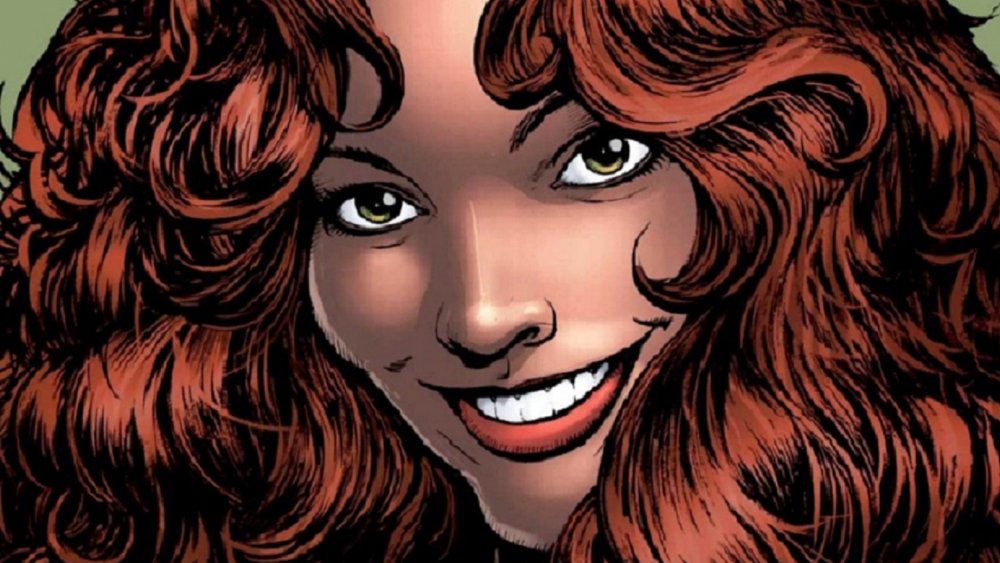Small Details You Missed In The Boys Season 2
Season one of The Boys made quite the splash, bringing Garth Ennis and Darick Robertson's comic to life on the small screen in suitably visceral style. The series isn't following the books closely, but so far, it's managed to capture the irreverence and overall tone of the source material quite well overall, satisfying longtime readers while drawing in a whole new group of fans along the way. Season two is now upon us, and it looks to try and outshine The Boys' first offering by upping the sheer insanity of events in a world populated by less-than-admirable superheroes as the rich story continues to unfold.
With eight new episodes and a slew of fresh scenes to comb through, this season promises to be a packed ride with references and nods that are easy to miss or just might not stand out after a single viewing. Carefully threaded in are links back to comics storylines, potential foreshadowing, and a love of pop culture that helps lighten the mood in spots, with details big and small that will keep viewers glued to the show. Here's a look at all the small details you missed in The Boys season 2.
The Cone of Silence
This is a show that enjoys its television references. Whether it's a nod to other projects that the cast and crew have worked on in the past or an easy-to-miss detail like having Chris Hansen of To Catch a Predator fame anchor a news broadcast, there are plenty of little things to look and listen out for. In the opening scene of The Boys season 2's first episode, the audience jumps back and forth between two events happening simultaneously as Black Noir cleans up a mess from the end of the previous season while Mr. Edgar, played by Giancarlo Esposito, negotiates the conditions of Vought's superheroes operating in the military. As the two men discuss collateral damage, Edgar gives his "official" response but then offers up a more realistic answer after using the phrase "cone of silence" to indicate its secrecy.
This is a reference to Get Smart, a comedic 1960s spy show starring Don Adams as Agent 86. In it, a running gag continually resurfaced around Maxwell Smart's desire to speak to the Chief privately, urging for the highest level of secrecy by using the Cone of Silence, a device consisting mostly of clear plastic that would lower from the ceiling and cover the heads of both men so they could communicate without fear of being heard. The device, however, rarely worked as intended.
Boys in the belly of the whale
The build to season two of The Boys has been strong, with Amazon showing off several clips of the upcoming hijinks and going as far as to release the first three minutes of the premiere episode. One of those clips depicts quite the confrontation on the high seas, which turns into a sticky situation on the beach involving the Deep and a whale. One detail that's easy to miss in The Boys season two comes after the whale's evisceration. Inside the messy mammal, Hughie has had enough and thinks the best course of action is to give up inside the beast, refusing Butcher's help. The bossy Butcher decides to leave him, knowing that they aren't safe there, and refers to his angry teammate as Pinocchio while he's walking off.
Many fans who are watching a series like The Boys may not have seen Disney's 1940 classic animated film Pinocchio in a while, but one of the later scenes involves a handful of the characters ending up trapped in the stomach of a giant whale named Monstro. In an effort to save his friends and father figure, Pinocchio devises a plan to make the sea creature sneeze so they can escape. Thankfully, all Hughie has to do to leave is crawl out of a giant speedboat-sized hole.
The heart of Black Noir
Anyone who's read the source material for The Boys doesn't need to be told how terrible of a person Black Noir is. It is difficult to explain how heinous he can be without spoiling some major plot points in the comics, but let's just say that the show has changed his character a good bit and probably won't even scratch the surface of his true vile nature. The new season shows that he isn't afraid to murder women, but will we see his other atrocities on display during the series?
In the first episode he's dispatched to kill Naqib, and after doing so he walks into the room of a small child while still holding the severed head. This moment concerned some fans who were in the know, as Black Noir's comics counterpart has been known to cannibalize children on occasion, but here we see him pick up a stuffed bunny and play with it for a moment, perhaps in an attempt to comfort the kid. (At least we hope so — there could have been more that the camera didn't show at that time.) This version of the character made for the small screen seems to be different, though, even touching his chest, as if moved, by the sight of Lucy the dead whale. It's a quick moment, easy to overlook, and it probably shouldn't be taken as a sign that Black Noir deserves to be seen as anything but an antagonist and killer, but it may indicate a softer side to this incarnation, or at least the showrunners trying to give him more personality.
Embrace the Music
After Butcher's rousing speech about the Spice Girls during season one — and MM bringing it back up in season two — we knew The Boys loved their selected tracks and musical mentions. Like many other things in the show, they've doubled down on incorporating more of these elements into the program, even as small parts of the plot. Hughie is seen watching and later discusses in detail the Billy Joel music video for his 1985 hit "You're Only Human (Second Wind)," while the earlier single "Pressure" from the same artist was also used in the first episode.
Billy Joel ties into Hughie's character even more down the line when he explains to Starlight that he is, in fact, 57 on the inside, as the two listen to "Only the Good Die Young" in the car. Later, he explains more about how his connection to this artist is a sad one, as it relates to his mother, who left. Billy Joel's music is one of the few good memories he has of her. A more comical moment comes after the Deep discusses his experience of doing shrooms at a Goo Goo Dolls concert and later viewers hear him lazily singing along to "Iris." It's right before a very memorable cameo by Patton Oswalt that works so well with the '90s hit as an introduction.
In something a little more fun that can easily go unnoticed, due to it coming in the middle of an intense scene, Homelander is urging Starlight to kill one of our heroes — or else he'll kill both of them — and instructs her how to do it. With a laugh and funny facial expression, he tells Annie January that it'll be easy and to put her "hands in the air like you just don't care" — a variation on the lyric from Cameo's hit "Word Up" and an excellent example of the show's dark humor in action. We do get something actually humorous when Hughie and Starlight break out into yelling another Billy Joel classic, "We Didn't Start the Fire," in what's almost a rare feel-good moment for the show, while one of the Deep's prospective brides laments an unfortunate Ed Sheeran tattoo.
Dawn of the Seven
Every good superhero franchise needs movies, and when you're in a world of real-life heroes, making sure those movies are actually good is probably even more important. In an episode three scene, we see someone pitching the script and storyboards for an upcoming film to the group, getting wrapped up in his own hype when going over the final scene and the big reveal of the ending, where he proudly proclaims the words, "Dawn of the Seven." This is all before following up with how to handle the dead team member that Lin-Manuel Miranda wants to voice.
The phrase in and of itself might not be enough to say that The Boys season two is nodding to the subtitle for Batman v Superman: Dawn of Justice, but that isn't the only clue here. At one point the film's director sings the name of Hans Zimmer — who was one of the composers on that particular film — when discussing the appropriate music for the scene, and then there's also the color scheme of the poster mocking up the film's logo. This is an even deeper cut than it looks like: The original comics for The Boys started out being published by WildStorm, a subsidiary of DC Comics, before moving over to Dynamite Entertainment. When fans see the movie being filmed in episode five, Homelander makes mention of the "Joss rewrites really singing," likely alluding to Joss Whedon taking over directing duties on Justice League. Whedon had also been brought in on several previous films to punch up scripts, so this works in two ways.
And don't worry that it's all about DC here — The Boys season 2 is also off to a good start with its potshots at Marvel. For example: Homelander making fun of the idea of having a visually impaired hero named Blindspot, who is pretty obviously inspired by Daredevil.
Butcher vs Hughie
Season two begins with the Boys in a rough spot. Not only are they hiding out underneath a pawn shop owned by the Haitian Kings as wanted criminals, but there is no Butcher, and that means no leadership. In his absence, Hughie tries to get his teammates to do things a bit differently and entertain other ideas, but this doesn't seem to fly, especially when Butcher returns with new motivations. It isn't long before their personalities clash and punches start flying between the two.
Hughie has always been a bit of the moral center for the group and a member of the team even points this out in episode three, saying "He's your canary, you let your canary die, how you gone know when you gone too far?" This is all fine and well, two headstrong people working through their issues, but for those familiar with the comics, this initial physical confrontation is also an unpleasant foreshadowing. Without going into major spoilers, the stories the show is based on see Butcher and Hughie experiencing a much greater disagreement on what needs to be done at the end of a long and depressing road with a lot of lives held in the balance. The two wind up doing a little more than just punching each other at that point. If the show follows suit, this will be a moment to look back on and see where it started.
Homelander in the Mirror
No one will ever accuse Homelander of being a pillar of sanity, or even remotely stable if we're being honest, but that doesn't mean he can't unravel more. This season has been particularly stressful for the Seven's leader as he tries to deal with issues surrounding a new team member that is stealing his thunder and the troubles of being a superhero dad, so it shouldn't be surprising that he might "snap." This is even more likely to happen when Homelander must face himself.
In a previous scene, it was established that the completely normal Homelander had the character of Doppelgänger (seen in the previous season) portraying the woman he killed, Madelyn Stillwell, for some cozy cuddling. This Mystique knock-off takes the initiative when Homelander says "I don't need anyone but myself," transforming into a copy of him — while still wearing the sexy lingerie — and leading into a rather awkward conversation that doesn't end well.
This situation somewhat resembles a scene in issue 49 of the comic, in which Homelander stands in front of a mirror and talks to himself. Here, someone speaks back, but there is a bit of a twist on that element. In both cases, it looks as if we get to see the character breaking down a little bit after being confronted by himself, but compared to the comic scene, the ending of this episode may show the cracks in Homelander's psyche a bit more clearly.
Walk like a politician
Season two of The Boys introduces a handful of new characters, of course, but a big one to keep an eye on is Victoria Neuman. This politician is working against Vought and their initiative to put superheroes in the military, but going against the mega-corporation is easier said than done. It's hard to say much about her beyond what we've seen so far, as she isn't technically in the comics. There, the character is Victor K. Neuman, who is more commonly known as Vic the Veep, but this George W. Bush parody from the source material is more than just a gender swap in the show. The personality (and especially the intelligence) of the character is completely different and the storyline seems to be as well — though maybe she still ends up as President down the line.
In the fifth episode, we see her speaking to a gathered crowd as Homelander swoops in to do damage control from his most recent PR nightmare, against the company's wishes. As he takes the microphone from Victoria to talk to the crowd he asks them, "Didn't you love that little 'Walk Like an Egyptian' dance she did online? So fun." This line is a reference to the video posted by Congresswoman Alexandria Ocasio-Cortez of herself grooving outside her office, which she uploaded in response to a previous clip that surfaced of Ocasio-Cortez dancing when she was in high school. The Boys has a lot of its own world-driving politics that play into the plot, but this might be the most blatant reference to a current real-world political situation so far. Is skillful dancing the only quality AOC and Victoria Neuman share?
TV Land
It isn't unusual for a fictional television program to reference other great shows, but season two of The Boys gives audiences an array of titles to notice and think about. This isn't just about the in-storyline shows starring the company's superheroes that are appearing on Vought+, spoofing Disney's new popular streaming service, but having Russian gangsters discussing the virtues of musicals like Hamilton and Dear Evan Hansen, or finding out that Mother's Milk is a fan of the show Outlander, which he tells Hughie to mind his own business about (in a less polite way).
In more character-appropriate moments, we see Homelander watching Taxi Driver. After witnessing how he wanted to handle the crowd who was getting angry with him in episode five, this may seem like the perfect relaxing film for someone so homicidal. On a much more jovial note, episode six has Frenchie hanging out with two close friends as they get high and discuss robbing banks. In this flashback, the future member of the Boys tells how he learned everything he knew from The Golden Girls. And of course, for all of those who wondered, Frenchie clarifies that he, out of his group of friends, was Bettie White. To cap it off, we even get to hear the theme song from the show at the end of this episode.
The Love Sausage
The show has given fans of the comics several great small references, tiny visual flourishes, and some fun name drops — like Malchemical. As the crew has their adventure at the psychiatric hospital, there are a ton of things to see, many of them just fun visuals or made up for the show, but the main attraction is a man who goes by the name of Love Sausage. (There are... reasons for the nickname.)
In the comics, Love Sausage, or Vasilii Vorishikin (called Vas for short) is a former Russian superhero, tank commander, and police officer, turned bar owner who befriends the Boys and especially Hughie. The communist hero possesses super strength and even helps the team take down one of their greatest challenges, Stormfront. It's a fun cameo, and potentially all we'll get of him in the show, but it was sure to make fans remember him.
Butcher, Baker, Candlestick Maker
Everyone has issues with their family, but saying that about the relationship between Billy Butcher and his father may be putting it too lightly. Butcher's parents are mentioned in a couple of previous episodes, mostly with him urging them not to come visit, getting out of having to see the blood relatives he's purposefully tried to estrange himself from, but eventually there is no way around it: Billy is suckered into coming to see his mother, who lies and says that his father has died. This is enough to get him there, but only to see that his dad is still alive (for the moment) and this leads to another fight, mostly around his dead brother Lenny. Butcher had a tough life growing up and his father tries to argue that the abusive patriarch's actions made him the strong man he is today.
Near the end of episode 7, Butcher meets up with his mother one more time — without dear ol' dad, thankfully — and when discussing his father's death, Billy tells her to let him know when it happens so he can urinate on the coffin. It isn't just a funny remark or an empty promise. Daddy Butcher was quite the piece of work and a bully in the comics, focusing most of his abusive tendencies on Billy and Lenny's mother. It bothers young William so much that he grabs a kitchen knife with the intent to murder his old man, but Lenny stops him and explains how that could hurt them more.
Hughie not only plays the same role that Lenny did — Butcher's canary, his conscience — but it's even mentioned that the two look the same, drawing more of a parallel. In the Butcher, Baker, Candlestick Maker miniseries that explains Butcher's past, he's looking down at the corpse of his father, going over his backstory, and when he's done, he does just what he promised.
The problem child
The season finale has a few instances that relate closely to the comics, especially in regards to setting up the next season and that great moment of Stormfront getting beaten down and then losing her eye — even if it was The female who took it out in the books — but the big one, of course, has to be in the spoilery climax to the whole season. There is a lot of fighting going on in those important few minutes and it looks like things are going to turn out even worse, but the ticking time bomb viewers were waiting for all season finally goes off, with a little push, and there are some casualties.
Not only is the Neo-Nazi Stormfront left as a shell of her former self, but Becca is also caught in Ryan's blast. This is similar to the source material in that her son is the cause of death for Butcher's wife, but in the comics, it's a bit more brutal: She's unknowingly pregnant, and the baby growing inside of her develops his powers and exits the womb violently, killing Rebecca, and shooting off its heat vision while flying around the room. This leaves Butcher stunned for a moment, but he ends up beating the murderous baby to death with a lamp.
All that comics history explains why some viewers were worried after seeing Karl Urban pick up a crowbar in the episode. Thankfully, things played out a bit differently here, but the event was obviously emotional and will linger with Butcher for quite some time.
